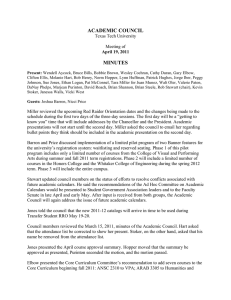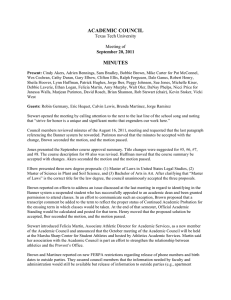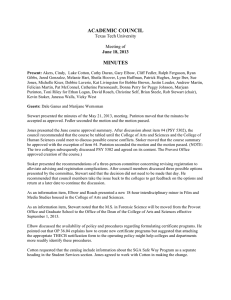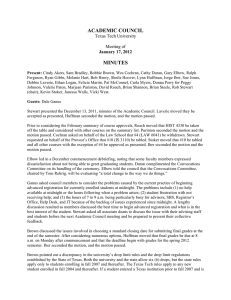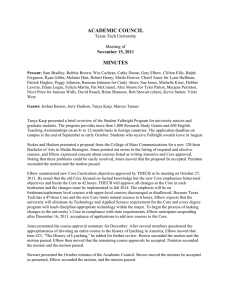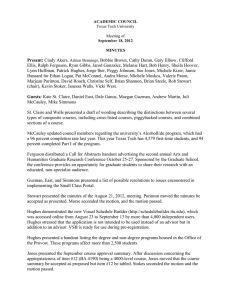ACADEMIC COUNCIL MINUTES Texas Tech University
advertisement
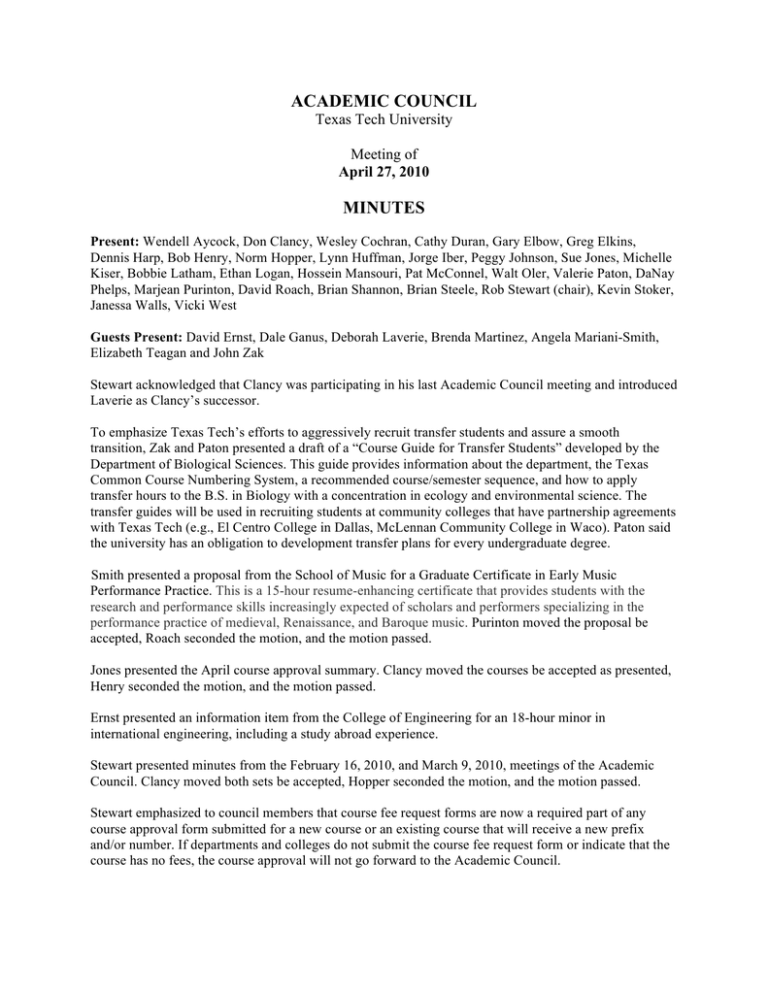
ACADEMIC COUNCIL Texas Tech University Meeting of April 27, 2010 MINUTES Present: Wendell Aycock, Don Clancy, Wesley Cochran, Cathy Duran, Gary Elbow, Greg Elkins, Dennis Harp, Bob Henry, Norm Hopper, Lynn Huffman, Jorge Iber, Peggy Johnson, Sue Jones, Michelle Kiser, Bobbie Latham, Ethan Logan, Hossein Mansouri, Pat McConnel, Walt Oler, Valerie Paton, DaNay Phelps, Marjean Purinton, David Roach, Brian Shannon, Brian Steele, Rob Stewart (chair), Kevin Stoker, Janessa Walls, Vicki West Guests Present: David Ernst, Dale Ganus, Deborah Laverie, Brenda Martinez, Angela Mariani-Smith, Elizabeth Teagan and John Zak Stewart acknowledged that Clancy was participating in his last Academic Council meeting and introduced Laverie as Clancy’s successor. To emphasize Texas Tech’s efforts to aggressively recruit transfer students and assure a smooth transition, Zak and Paton presented a draft of a “Course Guide for Transfer Students” developed by the Department of Biological Sciences. This guide provides information about the department, the Texas Common Course Numbering System, a recommended course/semester sequence, and how to apply transfer hours to the B.S. in Biology with a concentration in ecology and environmental science. The transfer guides will be used in recruiting students at community colleges that have partnership agreements with Texas Tech (e.g., El Centro College in Dallas, McLennan Community College in Waco). Paton said the university has an obligation to development transfer plans for every undergraduate degree. Smith presented a proposal from the School of Music for a Graduate Certificate in Early Music Performance Practice. This is a 15-hour resume-enhancing certificate that provides students with the research and performance skills increasingly expected of scholars and performers specializing in the performance practice of medieval, Renaissance, and Baroque music. Purinton moved the proposal be accepted, Roach seconded the motion, and the motion passed. Jones presented the April course approval summary. Clancy moved the courses be accepted as presented, Henry seconded the motion, and the motion passed. Ernst presented an information item from the College of Engineering for an 18-hour minor in international engineering, including a study abroad experience. Stewart presented minutes from the February 16, 2010, and March 9, 2010, meetings of the Academic Council. Clancy moved both sets be accepted, Hopper seconded the motion, and the motion passed. Stewart emphasized to council members that course fee request forms are now a required part of any course approval form submitted for a new course or an existing course that will receive a new prefix and/or number. If departments and colleges do not submit the course fee request form or indicate that the course has no fees, the course approval will not go forward to the Academic Council. Stewart presented a proposal from the College of Architecture for a 12-hour Graduate Certificate in Health Care Facilities Design. This interdisciplinary certificate will offer specialty courses to graduate students and design professionals in health care. Clancy moved the proposal be accepted, Aycock seconded the motion, and the motion passed. Huffman updated the council regarding changes in minors offered by the College of Human Sciences. • A minor in human sciences will be available. • A minor in nutrition will be available. • Early childhood will not be offered as a minor. • Nutritional sciences and dietetics will not be offered as a minor. • The current minor in family and consumer sciences will be discontinued. Elbow updated the council on the minor in military studies, which has three concentrations: military science (for Army ROTC students), aerospace studies (for AFROTC students), and military history (for general student body). Stewart reminded council members that the state has mandated that universities must award credit for military service and want to know how this credit will be applied. He said the university is in the process of developing a plan for applying military credit. Walls updated the council on the efforts of the Facilities Allocation Council (FAC) to implement a General Purpose Classroom initiative designed to address low classroom efficiency scores and identify priority General Purpose Classrooms based on a combination of several factors, including overall physical condition, accessibility issues, low space utilization efficiency performance, and campus location. The FAC-allocated funding, matched by Administration and Finance, will renovate and maintain classrooms as long as the classroom is categorized as a General Purpose Classroom. General Purpose Classrooms are beneficial to the colleges because the college/department will no longer be responsible for the expense of upgrading and/or maintaining/scheduling the classroom. FAC has selected five classrooms as the initial General Purpose Classrooms: Mathematical Sciences Room 12, Mathematical Sciences Room 108, Holden Hall 108, Human Sciences Room 273, and Science Room 10. In regard to non-credit sections attached to credit-bearing lectures or labs, Paton discussed requirements related to course inventory addition, section building, and classroom scheduling. In addition, she presented a draft of OP 32.02 clarifying teaching assistant (TA) data entry in Banner. Graduate TAs who have primary responsibility for teaching a course for credit and/or assigning grades must have earned at least 18 graduate hours in the teaching discipline. Those not meeting the requirements for baccalaureate faculty must also be under the direct supervision of a faculty member experienced in the teaching discipline, must receive regular in-service training, and must be evaluated regularly. These requirements do not apply to graduate teaching assistants engaged in assignments such as teaching physical education activities, assisting in laboratory sessions, attending or helping prepare lectures, paper grading, keeping class records, and conducting discussion groups. Elbow said the committee in charge of graduation ceremonies has decided to permanently schedule the Arts and Sciences graduation ceremony at 4 p.m. on Friday and the Graduate School ceremony at 7 p.m. on Friday in both the fall and spring semesters. All other undergraduates will be scheduled for ceremonies at either 9 a.m. or 1:30 p.m. on Saturday. Summer ceremonies will continue to incorporate both graduates and undergraduates in the 9 a.m. and 1:30 p.m. ceremonies. Elbow passed out a handout sheet showing graduation times for each college beginning in August 2010 for summer graduation and December 2010 for fall and spring semesters. He said the scheduled times would switch every two years (i.e., a college that has morning ceremonies for two years will transition to afternoon ceremonies the next two years). 2 Latham provided council members with a Request for Backdated Withdrawal form showing refund information for spring 2010. She stressed that forms submitted to Academic Records must be term specific. Jones presented revised academic calendars for 2011-12 and 2012-13. In addition, she presented an academic calendar for 2013-14 to continue with the university’s policy of planning calendars four academic years into the future. The two revised calendars were necessitated by release of a new Common Calendar regulating the start of classes for all state institutions. The calendars have been posted to the university official academic calendar website: www.depts.ttu.edu/officialpublications/calendar/index.php. Additional items discussed briefly include the following: • President Guy Bailey will host an upcoming town hall meeting on May 4 to discuss Responsibility Center Management. • When faculty members do not submit their book orders as early as possible to the bookstore, this increases textbook costs for students. The bookstore cannot offer students cash for their books unless the store knows that the books can be resold. This also reduces the availability of used books for future terms if the faculty member subsequently orders the same book. • Paton reported on attending a recent meeting related to the National Research University Fund. Because of the importance of graduating 200 doctoral students in the next two years, she urged colleges to identify what is inhibiting doctoral students from graduating, address those concerns, and then encourage as many summer graduates as possible. • Stewart introduced Brian Shannon, who will be attending Academic Council meetings as a representative of the Athletic Academic Council. 3
